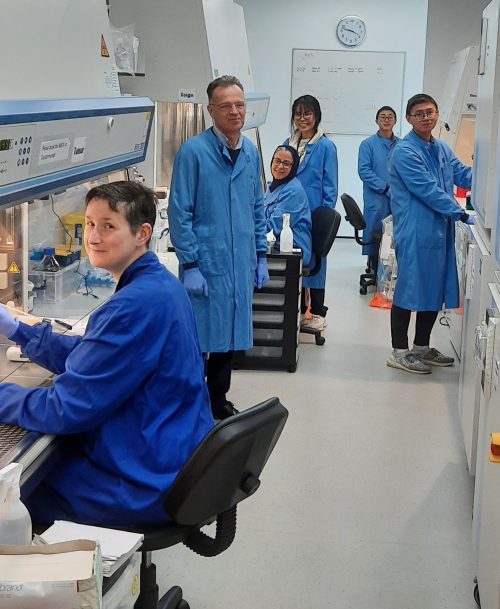Lab meeting with the Smith Lab
Posted by the Node, on 10 May 2023
Smith Group – Living Systems Institute – University of Exeter
Where is the lab?
Living Systems Institute, University of Exeter, UK
Research summary
Austin Smith: We study pluripotent stem cells in vitro and their relationship to transient pluripotent cells in mammalian embryos. To execute their potential, naive pluripotent cells must gain lineage competence, a process termed formative transition. We want to understand:
- how potency and competence are encoded by a dynamic regulatory network of signals, transcription factors and chromatin
- how cells transition between states of competence and how fate decisions are made
- how the trajectory and regulatory machinery of pluripotency is adapted in different mammals

Lab roll call
Tao Huang, post-doc, establishing naïve pluripotent stem cells from non-human primates
Zhili Ren, post-doc, investigating self-renewal and formative transition in human naïve stem cells
Arthur Radley, post-doc, investigating cell identities and trajectories by computational analysis of transcriptome data
Francesca Carlisle, experimental officer, supporting stem cell culture and next generation sequencing, plus lab manager for the group
Zhi (Klein) Zhang, PhD student, studying transition from trophectoderm to amnion competence
Jing Yen Yong, PhD student, studying capacitation of naïve cells for definitive endoderm formation
Favourite technique, and why?
Austin: Stem cell culture, because it is life in our hands – a path to understanding and control.
Apart from your own research, what are you most excited about in developmental and stem cell biology
Austin: The regenerative plasticity uncovered in adult stem cell tissues such as intestine and lung is very interesting. The dedifferentiation seen after injury, or during cancer formation, is a striking contrast to how we generally consider developmental trajectories and more complex than a simple reversal process.
How do you approach managing your group and all the different tasks required in your job?
Austin: My role as Institute Director takes a lot of my time so the people in my group have to be quite independent. Joint lab meetings with the group of Ge Guo who also work on pluripotency are the main forum where group members present and get feedback on their research. I often follow up with 1 to 1 discussion. In general, I like to let people get on with their own experiments and ideas. I get more heavily involved as results emerge and require discussion. I usually take the lead in paper planning and writing.
What is the best thing about where you work?
Austin: The Living Systems Institute combines different research interests. The open space design of our building is ideal for research and social interaction. Labs, facilities, and technical support are all good. We have good community space including an outdoor terrace. The atmosphere is friendly and supportive.
What’s there to do outside of the lab?
Austin: Great outdoors along the river, the Jurassic coast, and Dartmoor, with endless opportunities for recreation, relaxation, and exploration
Browse through other ‘Lab meeting’ posts featuring developmental and stem cell biology labs around the world.


 (4 votes)
(4 votes)